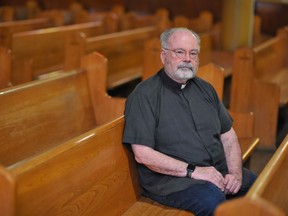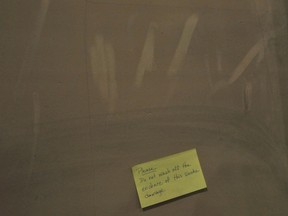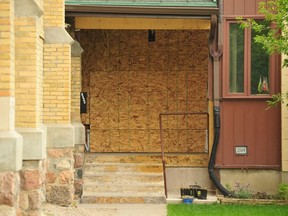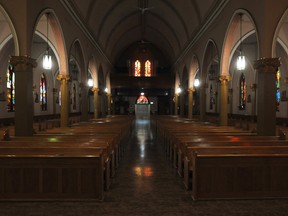
When Jordan Willett was arrested, he expressed remorse and told police the crime was not meant as a statement about the church, but a “random act” committed while extremely intoxicated.

Article content
Much has changed since a Catholic church was built on Regina’s Scarth Street in 1905.
It took on its present name — Blessed Sacrament Parish — in 1933. Perhaps dust had to be cleaned from inside the church back then, as was the case in so many prairie buildings during the Great Depression.
Today, a layer of dark filth clings to the walls and vaulted ceiling, like the inside of a smoker’s lungs — evidence of a Feb. 9 fire caused by arson.
Advertisement 2
Article content
On Tuesday morning, Father James Hentges sat in an office at the back of the building that’s been partially repaired. To get there, one has to walk past the pews because the side entrance closest to the office and the priest’s living quarters is still boarded up.
The actions of Jordan Willett, the man who set the fire, resulted in him too having to live behind a door that won’t open. He pleaded guilty to charges of arson and breaching probation. On April 9, he was sentenced to 15 months in jail, which after credit for time spent on remand works out to just over a year, followed by 18 months probation.

Then 31 years old, Willett was described by his lawyer Bruce Campbell as “a troubled man” who “would have some significant Gladue factors.” Gladue refers to issues that can affect an Indigenous offender, including the impact of colonialism, residential schools, racism, poverty and addiction.
At the time of the fire, Campbell said his client was unemployed and drinking heavily — his mental health issues not well managed. The defence lawyer said that the day after he set the fire, Willett tried to seek help from a psychiatric ward at a Regina hospital, but staff couldn’t find him a bed.
Article content
Advertisement 3
Article content
Although he was masked when he set the fire, police quickly learned his identity and found out he was living near the church, according to Crown prosecutor Chris White.
The prosecutor said that when Willett was arrested, he admitted to setting the fire and expressed remorse, telling police the crime was not meant as a statement about the church, but a “random act” that he carried out while extremely intoxicated.
White said the Crown had been unable to reach the church prior to sentencing, but some information about Willett was eventually relayed to Father Hentges.

“It was conveyed to us there was no animosity toward the church or myself, personally,” said the priest, who was displaced from his living quarters for about two-and-a-half months while professionals cleaned the area.
Regular services returned to the church about a month after the fire. The priest thinks that members of his congregation, many of whom initially found the crime “baffling,” have weathered the incident quite well, all things considered.
“I think the fact that it was not directly or even indirectly connected to the other church fires in Canada helped,” he said.
Advertisement 4
Article content
Willett’s crime was committed at a time when a series of church fires had become a topic of national discussion steeped in high emotions.
A number of politicians weighed in on the Regina church fire, including federal Conservative Leader Pierre Poilievre, who made a social media post about the incident asking anyone who could “identify the criminal” to contact authorities.
Former Conservative leader Andrew Scheer, a current MP for Regina—Qu’Appelle, also offered support by bringing a motion to the House of Commons. It was meant to express solidarity with the church, recognize the right of Canadians to worship safely, to “condemn the hateful act of arson” and the perpetrator, as well as to urge people to help police in the investigation.
After the fire, Hentges said he was contacted by a “politician from Ottawa” who wanted to increase sentences for crimes related to church fires, calling it a “freedom of religion issue.” The priest said the politician, whom he didn’t name, wanted him to write a letter of testimony and support.
“I said, ‘No, I will not support this,’” recalled Hentges. “That’s not the issue. The issue is how do we help our cities, our police, our mental health people, address these issues?”
Advertisement 5
Article content
The priest argued that increasing sentences would “not help the situation.”
“That being said, I don’t have any ready answers,” he added. “But caring for (Willett) in some way, you know, in terms of helping him with his alcohol problems, his mental health issues, is much better than just locking him up.”

The conditions attached to Willett’s coming probation include an order that he participate in mental health and substance abuse counselling.
“It’s a matter of the common good and for his good,” Hentges said, agreeing with the court’s approach.
As a generalization, the priest said there are a variety of ways people can find help for addiction, but mental health issues complicate matters.
“I think it’s incumbent upon our health-care system to provide adequate access to mental health services.”
As for the church itself, Hentges said most of the “heavy cleaning” has been completed and some repairs have been made, including to an organ.
The process of repainting its main room is meant to begin in September. He says that will include a “smoke sealant” to help the paint stick, and insurance will cover some of the costs. He noted that “some donors have stepped up” and, given the building’s “historical significance,” he hopes the City of Regina might consider chipping in.
Advertisement 6
Article content
He estimated that, by the end of the year, the physical evidence of the fire may be gone.
“Any church congregation these days has been impacted by declining membership, exasperated by the pandemic, and the isolation that took place there. And then we have this,” reflected Hentges.
“All these things add up, and people are not connected, but I think it’s beginning to turn around.”
He said the church is somewhat unique in that many people who attend do not live in the city’s downtown core where it’s located. Hentges noted it has also become a meeting place for immigrants from the African country of Eritrea and elsewhere.
“It’s changing,” he said. “This just is part of the changes.”
Recommended from Editorial
-

Priest from burned Regina church says inner-city issues need to be addressed
-

Regina police seek help regarding alleged church arson
The Regina Leader-Post has created an Afternoon Headlines newsletter that can be delivered daily to your inbox so you are up to date with the most vital news of the day. Click here to subscribe.
With some online platforms blocking access to the journalism upon which you depend, our website is your destination for up-to-the-minute news, so make sure to bookmark leaderpost.com and sign up for our newsletters so we can keep you informed. Click here to subscribe.
Article content
link





